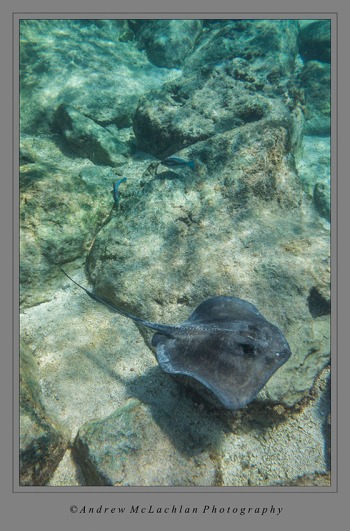The Cayman Islands is most noted for its amazing snorkeling and scuba diving and when I was making arrangements for my recent trip to Cayman Brac I made certain that I would be prepared to photograph life in the deep blue sea. The above photo was created on my departure as I began the long journey home. I created this image through the window pane of a Twin Otter aircraft using my Sony RX100. This amazing, yet tiny camera that will fit in a shirt pocket was my go-to piece of photo gear for my underwater adventure. The camera captures a 20 mega-byte image file when set to its RAW image capture mode. To find out more about how I used the camera underwater and for a few tips on underwater photography please read my recent article Into The Deep Blue Sea in the Creative Photography eMini-Magazine, a completely free and very informative on-line magazine and resource published by Denise Ippolito.
In the seascape image below I have encountered a little backscatter within the water column. Backscatter is the result of debris in the water and since I was photographing facing the sun, the effect of the debris was exaggerated but I do love the sun’s rays of light penetrating the surface. I do wish that a shark could have been swimming out of the depths for this image though 🙂
On one particular afternoon I came across a couple of local fishermen that were cleaning their catch and throwing the blood and guts back into the ocean, which attracted a great number of Stingrays. I grabbed my camera and immediately jumped into the water with the rays to create numerous images of them.
Fishes that are found within the oceans have always amazed me with their superb camouflage skills and during my numerous snorkeling trips I came across a few Peacock Flounders. Check out the image below to see how well they blend into their surroundings.
One of the most commonly encountered fishes were Parrotfish. Their colors were so intense, often resembling colors you would expect to see in neon signs.
I found some of the corals and sponges to me most fascinating too, especially the tube sponges that were most often encountered in deeper water of about 30-40 feet. Upon taking a breath I would dive down to create images of them. I found this to be most difficult to do as I would be fighting the body’s natural tendency to float back up to the surface. Often it would take several attempts to create the image I was seeking.
I was quite pleased with the Sony RX100’s performance below the sea in a dedicated housing and am looking forward to diving into Horseshoe Lake to experiment with some freshwater imagery.
Please click on the images to see the larger, sharper versions.
















These are amazing Andrew! I love that Yellow-tailed Parrotfish!
Thanks Michael